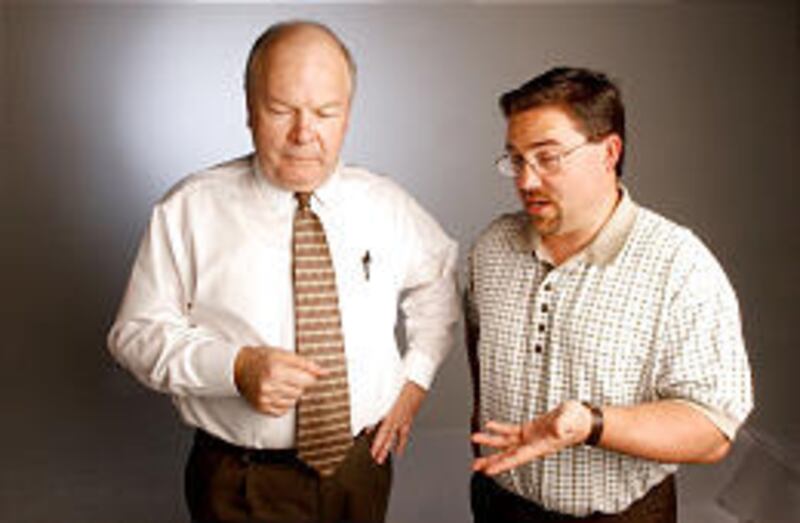Having dinner recently with a top official of the Anglican Communion in his British castle, two Utah men talked about their attempt to create a bridge of understanding between historical Christians and Latter-day Saints.
That they found themselves the guests of Bishop N.T. Wright of Durham, England, was just one of the pleasant surprises they've encountered on a public journey toward understanding that began five years ago as a discussion between friends.
Robert Millet, who holds an academic chair in religious understanding at Brigham Young University, and Greg Johnson, a Utah-born former Latter-day Saint who has become an evangelical minister, have been finding common religious ground since they first met in 1997. And since 2000 they've been talking about it publicly with whoever cares to listen.
Bishop Wright has reason to tune in. He is currently trying to help bridge the chasm created by American Episcopal bishops, who ordained an openly gay bishop in 2003, and the bulk of the 77-million member worldwide Anglican Communion of which they are a part.
Many Anglicans say the Americans have ignored scripture and Christian teaching, while the U.S. bishops counter that their action embodied the highest biblical mandate to love one another without reservation.
While both camps believe in Jesus Christ and the Bible, their approach to the issue of homosexuality comes from widely different poles on the religious and political spectrum. Though the chasm has threatened to throw the faith into schism, Anglicans share much common ground.
So it is with Latter-day Saints and evangelical Christians, say Millet and Johnson, though both concede there are significant doctrinal differences between historic Christianity and a faith that claims to be a restoration of Christ's original gospel.
The history of interaction between The Church of Jesus Christ of Latter-day Saints and most long-established Christian faiths has been a rocky one ever since Joseph Smith told Christian ministers he had seen God and Jesus Christ in a vision in 1820. Smith's subsequent publishing of a unique scriptural canon known as the Book of Mormon and other extrabiblical scriptural texts set Latter-day Saints apart in significant ways from Protestant and Catholic tradition and teaching.
The differences simmered for decades, with occasional spurts of public discussion. But Southern Baptist Convention leaders' public proclamations in the late 1990s that Latter-day Saints were not Christians brought the topic into focus on the public stage, as LDS leaders countered the claims.
Since then, both Johnson and Millet have looked for similarities, and maintain the two traditions have more in common than most had supposed during the past 175 years since the LDS Church was organized. And they've taken their message on the road in recent years, holding increasingly frequent public appearances on a variety of college campuses including Harvard, UCLA and Fuller Theological Seminary.
After receiving permission from the LDS Church's First Presidency, they organized the appearance of widely known Christian theologian Ravi Zacharias at the Tabernacle on Temple Square last November, and have since taken heat from some in both religious camps for their peacemaking efforts.
In the process, they've garnered enough curiosity that network television has taken notice. The CBS Sunday Morning News got wind of their discussions and sent a film crew to Boise in early March to chronicle their dialogue.
They've started a weekly one-hour dialogue on local TV, with a live call-in format that producers believe will draw viewers to Channel 20. "Bob and Greg in Conversation" will air Tuesdays from 9 to 10 p.m.
They're also organizing another large public forum similar to the Zacharias event, only this time it will be held in an evangelical venue in California and feature a yet-to-be-named LDS leader.
And in the process, they don't shrink from asking tough questions, and from acknowledging failings that continue to keep suspicion simmering between people on either side. "On too many occasions, Latter-day Saints can be guilty of taking the attitude of 'If I can't baptize them, I don't know what to do with them,' " Millet said. "We need to acknowledge there is something even deeper than doctrine and theology, and that's our humanity."
He said conflict often arises because both groups take the obligation to share the gospel of Christ seriously. "But underlying that has to be a real love for people, rather than seeing them as a (potential) baptismal statistic."
Johnson remembers a conversation with one of Millet's colleagues at BYU, who reaffirmed to him that Millet was never going to see things Johnson's way, and then asked, "so what's the point?"
That mind-set is reflected in the willingness on both sides to be patient and invest time talking when you're convinced the other person is beginning to see things your way, Johnson said. "But the moment we see that not happening we think we have to move on and use our time in more productive ways ... Yet we live in a world where friendship is just as important."
"Debate and confrontation are the easy way," Millet said. "We say: Are you willing to invest some time in this so you can learn something," rather than soaking in self-righteousness?
Doing so "just doesn't compromise us," Johnson said. "It's harder to want someone to see it your way, but to not give up when they don't."
E-mail: carrie@desnews.com

